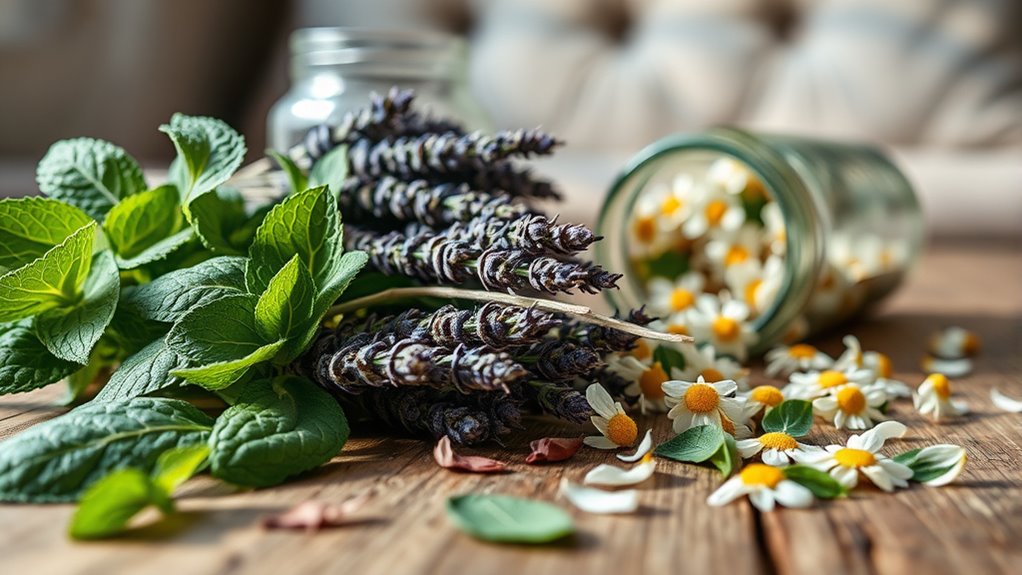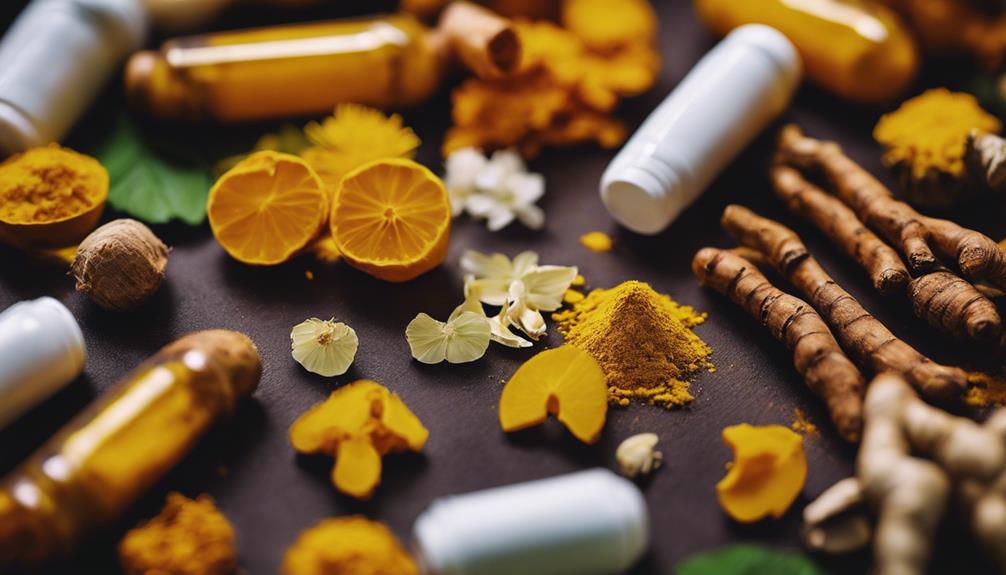If you’re exploring herbal options for chronic back pain, herbs like turmeric and ginger can help reduce inflammation naturally, while willow bark offers systemic pain relief similar to aspirin. Arnica, applied topically, eases muscle soreness and swelling. Keep in mind, it’s important to consult a healthcare professional before trying new supplements to make certain of safety and proper use. Continuing your journey can reveal more about how these remedies work and how to incorporate them safely.
Key Takeaways
- Herbal anti-inflammatories like turmeric and ginger may reduce back pain caused by inflammation when used properly.
- Willow bark offers natural systemic pain relief similar to aspirin, but should be used under professional guidance.
- Arnica topically relieves muscle soreness and inflammation, but is not suitable for internal use without medical advice.
- Effectiveness depends on correct dosage, consistent use, and consulting healthcare providers to avoid interactions.
- Herbal remedies can support holistic back pain management but are not a substitute for comprehensive treatment plans.

Chronic back pain can considerably disrupt your daily life, but many people turn to herbs as a natural way to find relief. If you’re seeking alternatives to medication or invasive treatments, herbal remedies offer a promising option. Among these, herbal anti-inflammatories are particularly popular because they target inflammation, a common cause of persistent back pain. These natural anti-inflammatories work by reducing swelling and easing discomfort without some of the side effects associated with pharmaceuticals. For example, herbs like turmeric contain curcumin, which has potent anti-inflammatory properties. Incorporating turmeric into your diet or taking supplements could help diminish inflammation and improve your mobility. Similarly, ginger is another herbal anti-inflammatory that may help reduce pain by blocking pain-causing compounds in the body.
When it comes to natural pain relief, herbs can provide a gentle yet effective alternative. Many individuals find that herbal remedies not only reduce pain but also support overall well-being. For instance, willow bark has been used for centuries as a natural pain reliever because it contains salicin, a compound similar to aspirin. Using herbal pain relievers like this can help lessen the need for over-the-counter drugs, which sometimes cause gastrointestinal issues or other side effects. You might also consider arnica, which is often applied topically to relieve muscle soreness and inflammation. While arnica is not suitable for internal use, it can be quite effective when used as part of a holistic approach to back pain management.
It’s important to remember that herbal remedies are most effective when used correctly and consistently. You should consult with a healthcare professional before starting any herbal supplement, especially if you’re on other medications or have underlying health conditions. While many herbs are safe, they can interact with medications or cause allergic reactions in some individuals. Proper guidance ensures you get the most benefit from herbal anti-inflammatories and natural pain relief options without risking adverse effects.
Frequently Asked Questions
Are Herbal Remedies Safe for Long-Term Use?
You wonder if herbal remedies are safe for long-term use. While many herbs are natural, herbal safety varies, and prolonged use can sometimes cause side effects or interact with medications. It’s essential that you consult with a healthcare professional before using herbs long-term. Monitoring your response and sticking to recommended doses helps guarantee safe long-term use, preventing potential health risks associated with unchecked herbal consumption.
Can Herbs Completely Replace Conventional Back Pain Treatments?
Think of your back pain treatment like a puzzle; herbs are one piece, but not the whole picture. While holistic approaches and herbal remedies can help manage pain, they have limitations and shouldn’t replace conventional treatments entirely. Herbs can support your recovery, but relying solely on them might leave gaps. Combining herbal remedies with medical care offers a more complete approach, ensuring safer, more effective relief.
Which Herbs Have the Strongest Scientific Evidence for Back Pain Relief?
When considering herbal efficacy for pain management, you want herbs supported by solid evidence. Research shows that turmeric, with its active compound curcumin, has anti-inflammatory properties that may help reduce back pain. Devil’s claw is another herb with some scientific support for pain relief. While these herbs can aid your pain management strategy, always consult your healthcare provider to guarantee safe and effective use, as evidence varies.
How Do I Determine the Correct Dosage of Herbal Supplements?
Did you know that improper herbal dosage causes 60% of supplement-related adverse effects? To determine the correct herbal dosage, always start with the supplement measurement instructions on the label. Consult a healthcare professional for personalized advice, especially if you’re on medication. Avoid guesswork, as accurate supplement measurement guarantees safety and effectiveness. Remember, following recommended dosages helps you get the most benefit without risking side effects.
Are There Any Side Effects or Interactions With Other Medications?
You should be aware that herbal supplements can cause side effects like allergic reactions and may interact with other medications. Always check for potential drug interactions before adding herbs to your routine, and consult your healthcare provider. Be cautious if you have allergies, and monitor for any adverse reactions. It is crucial to stay informed and communicate with your doctor to ensure safe use and avoid unintended health issues.
Conclusion
So, next time your back aches, don’t just reach for the latest herbal miracle. Maybe a soothing cup of chamomile or a dash of turmeric will do the trick—if you believe in fairy tales. After all, when it comes to chronic pain, the real cure might be as simple as patience and a good stretch, not hype. But hey, if herbs make you feel better, who’s to argue? Just don’t expect miracles—unless they come wrapped in a pretty leaf.










